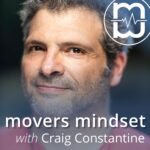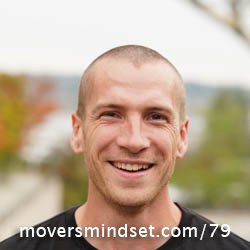
What can be learned from training parkour and engaging with challenges of height about composure, awareness, and personal growth?
Bryan Riggins discusses his motivation, goals, and process of training descents, and his experiences and relationship with fear. He shares how it relates to his love of coaching children, and the challenges he personally works on. Bryan unpacks his reasons for training parkour before delving into the many books that have influenced him and what is on his reading list.
“I think that fear has a place always. I think that if people think that it doesn’t exist or that they don’t have it, they’re lying to themselves.” ~ Bryan Riggins (14:18)
The conversation discusses the lessons drawn from parkour, particularly training descents, and how these experiences shape personal awareness and composure. Central themes include managing fear, the importance of intentionality, and the application of these principles in teaching children and coaching others. Bryan reflects on how parkour serves as a means for self-discovery and resilience building.
The discussion also drops into the philosophical aspects of parkour, such as the value of breaking challenges into manageable parts and the role of journaling in tracking progress. Broader reflections on teaching emphasize equipping students with tools to manage emotional responses, fostering a growth-oriented mindset, and creating meaningful connections between physical practice and personal development.
Takeaways
Awareness in training — The importance of being present and intentional in physical practice.
Fear as a tool — Fear is acknowledged as a constant presence, offering opportunities for growth rather than avoidance.
Coaching children — Effective teaching strategies involve mindfulness and providing tools for emotional management.
Challenge breakdown — Success in parkour often depends on dividing large challenges into smaller, manageable steps.
Journaling for reflection — Documenting training helps reinforce learning and track progress.
Social media’s role — Social platforms are seen as both an opportunity for connection and a potential distraction from meaningful practice.
Mindset in challenges — A fixed mindset can limit growth, while a focus on adaptability fosters resilience.
The influence of books — Literature and philosophical insights inform both training and teaching methodologies.
Resources
The Rock Warrior’s Way — Arno Ilgner’s book that discusses awareness, attention, and intention in training.
Parkour Visions — An organization where the speaker coaches and develops programs.
Momo — Michael Ende’s’ magical realism book mentioned as inspiring.
A Thousand Plateaus — by Gilles Deleuze and Félix Guattari, a philosophical work exploring complex ideas.
(Written with help from Chat-GPT.)
— Hello👋 I’m Craig Constantine.
In the Movers Mindset podcast, I talk with movement enthusiasts to learn who they are, what they do, and why they do it. I’m interested in the nature and philosophy of movement and in exploring themes like independence, self-direction, and human excellence. My interests color each conversation and provide some structure to Movers Mindset. But since I like to take the scenic route, every conversation ends up going somewhere unique.
The purpose of Movers Mindset is to create and share great conversations with movement enthusiasts. Each conversation feeds my insatiable curiosity, but I share them to turn on a light for someone else, to inspire them, or to give them their next question.
I appreciate your time and attention, and I don’t take it for granted.
— Thank you!
Want more? Subscribe to the email list for weekly updates—new episodes and archive highlights delivered to your inbox.
I invite you to cultivate a meaningful life—through presence, not pursuit. You can learn more about me and all my projects at, https://craigconstantine.com.
If you like what I’m doing through Movers Mindset, learn more about becoming a patron.
ɕ
